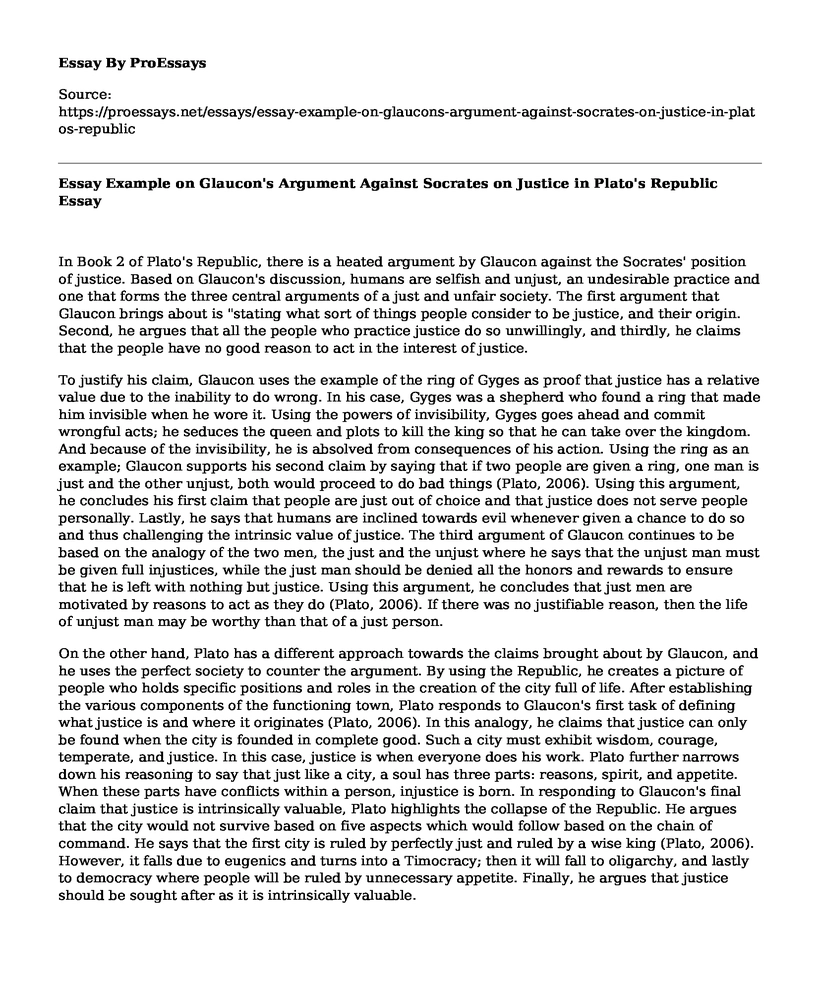In Book 2 of Plato's Republic, there is a heated argument by Glaucon against the Socrates' position of justice. Based on Glaucon's discussion, humans are selfish and unjust, an undesirable practice and one that forms the three central arguments of a just and unfair society. The first argument that Glaucon brings about is "stating what sort of things people consider to be justice, and their origin. Second, he argues that all the people who practice justice do so unwillingly, and thirdly, he claims that the people have no good reason to act in the interest of justice.
To justify his claim, Glaucon uses the example of the ring of Gyges as proof that justice has a relative value due to the inability to do wrong. In his case, Gyges was a shepherd who found a ring that made him invisible when he wore it. Using the powers of invisibility, Gyges goes ahead and commit wrongful acts; he seduces the queen and plots to kill the king so that he can take over the kingdom. And because of the invisibility, he is absolved from consequences of his action. Using the ring as an example; Glaucon supports his second claim by saying that if two people are given a ring, one man is just and the other unjust, both would proceed to do bad things (Plato, 2006). Using this argument, he concludes his first claim that people are just out of choice and that justice does not serve people personally. Lastly, he says that humans are inclined towards evil whenever given a chance to do so and thus challenging the intrinsic value of justice. The third argument of Glaucon continues to be based on the analogy of the two men, the just and the unjust where he says that the unjust man must be given full injustices, while the just man should be denied all the honors and rewards to ensure that he is left with nothing but justice. Using this argument, he concludes that just men are motivated by reasons to act as they do (Plato, 2006). If there was no justifiable reason, then the life of unjust man may be worthy than that of a just person.
On the other hand, Plato has a different approach towards the claims brought about by Glaucon, and he uses the perfect society to counter the argument. By using the Republic, he creates a picture of people who holds specific positions and roles in the creation of the city full of life. After establishing the various components of the functioning town, Plato responds to Glaucon's first task of defining what justice is and where it originates (Plato, 2006). In this analogy, he claims that justice can only be found when the city is founded in complete good. Such a city must exhibit wisdom, courage, temperate, and justice. In this case, justice is when everyone does his work. Plato further narrows down his reasoning to say that just like a city, a soul has three parts: reasons, spirit, and appetite. When these parts have conflicts within a person, injustice is born. In responding to Glaucon's final claim that justice is intrinsically valuable, Plato highlights the collapse of the Republic. He argues that the city would not survive based on five aspects which would follow based on the chain of command. He says that the first city is ruled by perfectly just and ruled by a wise king (Plato, 2006). However, it falls due to eugenics and turns into a Timocracy; then it will fall to oligarchy, and lastly to democracy where people will be ruled by unnecessary appetite. Finally, he argues that justice should be sought after as it is intrinsically valuable.
Conclusion
In conclusion, I would agree with Plato's argument in the first issue that justice is the product of a person's soul. If a person has inner conflicts within himself, then they turn out to be wicked and unjust people. However, internal peace and harmony promote justice and the inability to harm other people. Responding to the second issue; I believe that justice is intrinsic and disagree with Glaucon's argument that it is an act by unwilling people. I think that people are not born evil. Instead, they learn to be unjust as they grow up. In other words, the environment that a person grows up in influences that person to be just or not. And lastly, people should always pursue justice as it is worth pursuing and preserves peace. An unjust person is a slave to his passion; his desires are limitless, and such a person drowns in the bottomless pit of greed.
References
Plato. (2006). The Republic. New Haven, CT: Yale University Press.
Cite this page
Essay Example on Glaucon's Argument Against Socrates on Justice in Plato's Republic. (2023, Jan 23). Retrieved from https://proessays.net/essays/essay-example-on-glaucons-argument-against-socrates-on-justice-in-platos-republic
If you are the original author of this essay and no longer wish to have it published on the ProEssays website, please click below to request its removal:
- Essay on Native People Living in the US
- Historical Context of Simulation Hypothesis Essay
- Research Paper on Should 'Mental Harassment' in a Conjugal Relationship Be a Criminal Offense?
- Ethical Practice in Criminal Justice Essay
- Hispanics' Unfavorable View of Police: Reasons & Impact - Essay Sample
- Essay Example on Predatory Crime: A Dualistic Relationship of Conflict & Consensus
- Nurses' Collective Bargaining: Protecting Rights Since 1935 - Free Report Example







